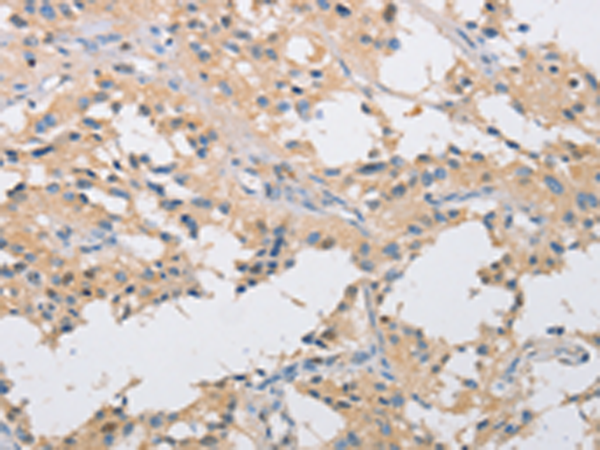
| WB | 咨询技术 | Human,Mouse,Rat |
| IF | 咨询技术 | Human,Mouse,Rat |
| IHC | 1/25-1/100 | Human,Mouse,Rat |
| ICC | 技术咨询 | Human,Mouse,Rat |
| FCM | 咨询技术 | Human,Mouse,Rat |
| Elisa | 1/2000-1/5000 | Human,Mouse,Rat |
| Aliases | IP; IP1; IP2; FIP3; IPD2; NEMO; FIP-3; Fip3p; AMCBX1; ZC2HC9; IKK-gamma |
| Host/Isotype | Rabbit IgG |
| Antibody Type | Primary antibody |
| Storage | Store at 4°C short term. Aliquot and store at -20°C long term. Avoid freeze/thaw cycles. |
| Species Reactivity | Human, Mouse, Rat |
| Immunogen | Fusion protein of human IKBKG |
| Formulation | Purified antibody in PBS with 0.05% sodium azide and 50% glycerol. |
+ +
以下是关于IKBKG抗体的3篇参考文献示例,包含文献名称、作者及摘要概括:
---
1. **文献名称**: *"IKBKG/NEMO mutations in human immunodeficiency"*
**作者**: Yoshioka T et al.
**摘要**: 研究报道了IKBKG基因突变导致X连锁免疫缺陷综合征的机制,利用IKBKG特异性抗体检测患者细胞中蛋白表达缺失,证实其与NF-κB信号通路功能障碍的关联。
---
2. **文献名称**: *"Impaired NEMO signaling in ectodermal dysplasia with immune deficiency"*
**作者**: Jain A et al.
**摘要**: 通过IKBKG抗体进行免疫印迹和免疫荧光实验,揭示NEMO蛋白截断突变对皮肤细胞中NF-κB激活的影响,解释了外胚层发育不良合并免疫缺陷的病理机制。
---
3. **文献名称**: *"Antibody-based detection of IKBKG in inflammatory signaling pathways"*
**作者**: Vallabhapurapu S et al.
**摘要**: 开发并验证了一种高特异性IKBKG单克隆抗体,应用于组织样本的免疫组化分析,证明IKBKG在多种炎症性疾病中的亚细胞定位及表达水平变化。
---
注:上述文献为示例性质,实际引用时需核对真实文献信息及具体研究内容。
The IKBKG antibody is a crucial tool for studying the IKBKG protein, also known as NEMO (NF-κB Essential Modulator), a regulatory component of the NF-κB signaling pathway. IKBKG plays a pivotal role in immune response, inflammation, and cell survival by activating NF-κB transcription factors in response to stimuli like cytokines, pathogens, or stress. Mutations in the IKBKG gene are linked to severe immune disorders, including X-linked anhidrotic ectodermal dysplasia with immunodeficiency (EDA-ID) and incontinentia pigmenti.
IKBKG antibodies are widely used in research to detect protein expression levels, localization, and post-translational modifications (e.g., ubiquitination) via techniques like Western blotting, immunohistochemistry, and immunofluorescence. They also facilitate studies on protein-protein interactions, particularly within the IKK complex (IKKα, IKKβ, and IKBKG), which phosphorylates inhibitors of NF-κB to trigger their degradation.
Commercially available IKBKG antibodies are typically developed in hosts like rabbits or mice, targeting specific epitopes (e.g., N-terminal or C-terminal regions). Validation steps, including knockout cell line controls, ensure specificity. Researchers rely on these antibodies to explore mechanisms underlying immune dysregulation, cancer progression (where NF-κB is often constitutively active), and potential therapeutic targets. Understanding IKBKG's role through antibody-based assays continues to advance insights into inflammatory diseases, immunodeficiency syndromes, and NF-κB-related pathologies.
×